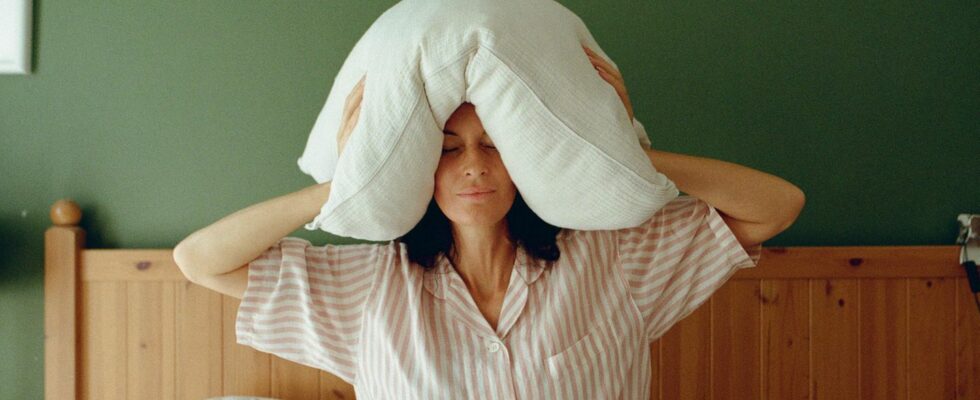Gender sleep gap
That’s why women suffer from a sleep deficit more often than men
© Tanya Yatsenko / Adobe Stock
Who gets up in the middle of the night to feed the baby and who comforts the schoolchild when he has nightmares? Usually these are the mothers. They pay with their sleep. In the long term, this can endanger your health.
80 percent of Germans don’t sleep enough. However, women are much more likely to suffer from this sleep deficit than men. The phenomenon is called the gender sleep gap – and it not only deprives women of their rest, but can also cause health problems.
Too little sleep is so harmful
An adult person needs at least seven and a half to nine hours of sleep per night. Most people don’t get enough hours – the German one Average is less than seven hours – although doctors’ practices and health news always point out how important a night’s sleep is. The body needs the rest phase to regenerate. During sleep, important repair processes are initiated that strengthen the immune system, stimulate memory formation, and so on. Getting enough sleep has many benefits, while too little poses dangers, for example Increased risk of depression or heart disease. One A study by the Spanish Center for Cardiovascular Research even found that people who get less than six hours of sleep per night have a 27 percent higher risk of atherosclerosis, which leads to blockage of the veins and thus heart failure, stroke or aneurysm can contribute.
Virtually every part of the body – and every bodily process – is affected by sleep in some way. And it’s not just physical symptoms that result from lack of sleep. One study from the Institute for Aerospace Medicine showed that cognitive abilities suffer after just one night that is too short. If someone doesn’t sleep enough for several days in a row, the losses are often serious. Most people then react in roughly the same way as if they had a blood alcohol content of 0.6 per mille. Nevertheless, people tend to make careless compromises when it comes to their sleep. Everyday life is too busy, too many to-dos haunt us until late at night. The clinical psychologist Shelby Harrisauthor of “The Woman’s Guide To Overcoming Insomnia,” also calls the phenomenon “momsomnia” because mothers often “only have a few quiet hours at night in which they can do things” – or worry about all sorts of things.
Gender Sleep Gap: Women sleep three hours less per night
According to a study conducted in the UK Opinion poll the Sleep Foundation from 2019, which surveyed 2,000 Brits, On average, women sleep three hours less than men – and that per night. A serious difference that is surprising at first, but is actually quite obvious upon closer inspection. Let’s assume an average family and ask ourselves the following questions: Who gets up at 3 a.m. to feed the baby and who comforts the school-age child when he or she has an earache? Usually these are the mothers. They pay with their sleep and in return they experience irritability, headaches and fatigue, to name just a few of the direct consequences of lack of sleep. In the long run, this deficit can even become really dangerous, as described above.
Of course, mothers are not the number one caregiver in all family structures. Fortunately, equality in parenthood is becoming increasingly important. Maybe the father also takes parental leave or gets up at night to look after the child. In reality, however, we are still far from equality. Because women usually do the majority of the care work, while men work. And because care work is still much less recognized than paid work, fathers say: “I have to be fit tomorrow, I have a long day of work ahead of me.” The fact that a woman’s day is certainly not shorter, that she runs the house, looks after the children and therefore also works, is forgotten.
Gaps everywhere
According to that Federal Statistical Office In 2022, women in Germany did an average of around nine hours more unpaid work per week than men. That corresponds to one hour and 17 minutes per day. The gender care gap was 43.8 percent. The gender care gap causes, among other things, the gender sleep gap. Because if mothers are still primarily responsible for the care work, they are also the ones who pay with their sleep. And that’s not all: the gender pay gap actually plays a role here too. If women earned the same money as their male colleagues for the same work, then men would probably also take longer parental leave. Unfortunately, for many families it is simply not financially possible to freely decide who stays at home, how and when, because they are dependent on the higher salary.
More sleep for mothers
The good news is: Women are not helpless against the gender sleep gap per se. If couples share the care work for their children – especially at night – more fairly, then the gap will also narrow and fewer sleepless nights for women. Even if you have to breastfeed your child at night and your partner cannot support you, he can look after him early in the morning and take on tasks such as making breakfast and changing diapers. In addition, dad can drive away the monsters under the bed at least as well as mom. Of course, that’s not all. The gender sleep gap is also a structural problem that is caused by the gaps mentioned above and is not just a matter of redistributing tasks within one’s own household. But at least that would be a start that can gradually give mothers a little more sleep.
Sources used: geo.de, spiegel.de, spectrum.de, washingtonpost.com, destatis.de, rnd.de

